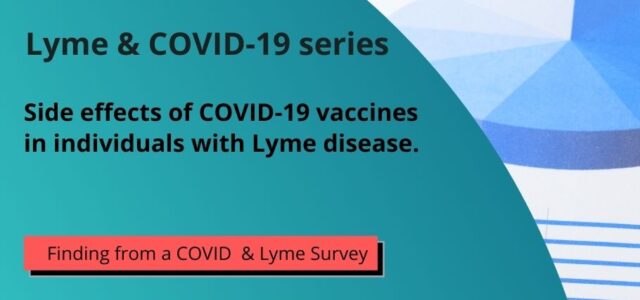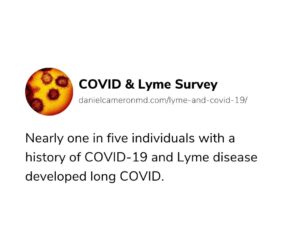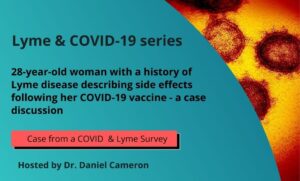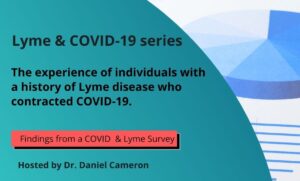Call for your appointment today 914-666-4665 | Mt. Kisco, New York

COVID-19 vaccine side effects in Lyme disease patients
HIGHLIGHTS
Question: Some individuals with a history of Lyme disease have expressed concerns that their Lyme disease symptom burden would increase if they were vaccinated for COVID-19. What is the clinical presentation of someone with a history of Lyme disease who has taken the COVID-19 vaccine?
Findings: This cross-sectional study reveals a high symptom burden in 1,168 individuals with a history of Lyme Disease. The GSQ-30 measure of symptom burden for 616 individuals with a history of Lyme disease who were vaccinated against COVID-19 was significantly lower than the symptom burden for the 552 who were not vaccinated.
Meaning: Contrary to common concerns, the COVID-19 vaccine did not worsen the symptom burden for individuals with a history of Lyme disease. Instead, the symptom burden was significantly lower relative to those who were not vaccinated. However, it remains possible that a small number of individuals would have negative reactions to the COVID-19 vaccine.
Background, method, results, and conclusion
There have been concerns that other rare or serious outcomes associated with the vaccine were not identified in Phase 3 of the vaccine trials. An interim analysis of the safety surveillance data from Vaccine Safety Datalink raised concerns regarding the restrictive inclusion criteria, the limited duration of follow-up, and that trial participants did not reflect the general population who ultimately received the vaccine.2
The list of exclusions from trials obtained from clinicaltrials.gov that may have affected the results of the vaccine include 1) recurrent severe infections 2) autoimmune conditions, 3) serious psychiatric condition, and 4) “Any other significant disease, disorder or finding which may significantly increase the risk to the volunteer because of participation in the study, affect the ability of the volunteer to participate in the study or impair interpretation of the study data.”3 Some individuals with a history of Lyme disease may have been excluded from these trials.
Post-vaccine surveillance is crucial to ensure safety, maintain trust, and inform vaccination policy. In addition, some individuals with a history of Lyme disease have expressed concerns that their Lyme disease symptom burden would increase if they were vaccinated for COVID-19.
But what are the symptoms and their burden for individuals with a history of Lyme disease who have taken the COVID-19 vaccine, and how do they compare with those who have not been vaccinated? In this cross-sectional Survey, 616 vaccinated and 552 unvaccinated individuals shared their experiences.
Methods
These findings summarize the results of a cross-sectional descriptive survey investigating the burden of Lyme disease. Participants were recruited through a snowball sampling strategy via social media. This Survey was conducted in accordance with the Declaration of Helsinki and approved by the Western Institutional Review Board.
The GSQ-30 questionnaire is a brief self-report scale designed to assess the symptom burden in Lyme disease (LD). The GSQ-30 asks “How much have you been bothered by any of the following?” for each of 30 items, that in tandem assess four domains, with each item rated on a five-point Likert scale. Responses include “Not at all,” “A little bit,” “Somewhat,” “Quite a bit,” and “Very much” (scored 0-4, for a total score of up to 120). Each domain is relevant to LD (pain/fatigue, neuropsychiatric, neurologic, and viral-like symptoms).1
Results
Vaccination status: 616 (52.7%) had received a COVID-19 vaccine, and 552 (47.3%) had not; 17.9% reported being unvaccinated but were willing to receive a COVID-19 vaccine.
Of the vaccinated, 55.5% received the Pfizer vaccine, 32.8% received the Moderna vaccine, 9.1% received the J & J vaccine, and 2.6% received another vaccine.
The GSQ-30 measure of symptom burden for the 616 individuals with a history of Lyme disease who were vaccinated against COVID-19 was significantly lower than for the 552 who were not vaccinated (43.5 vs. 46.6, p = 0.040). The symptom burden for those who were vaccinated was still greater than for healthy controls (mean=6) and patients with an EM rash (mean=24.15), traumatic brain injury (TBI) (mean 32.28), depression (mean 42.28, and PTLDS (mean 42.38) described in a validation paper.1
Most vaccine recipients reported at least minor side effects of some kind: This included 84.7% of Moderna and J & J recipients, and 80.4% of Pfizer recipients. The differences in side effect rates between the vaccines were not significant. Their most common side effects were pain at the injection site (88.92%) and fatigue (72.97%). Severe side effects were reported by 25.7% for Moderna recipients, 19.6% of J & J recipients, and 19.6% of Pfizer recipients.
Only 25 individuals who took the vaccine (4%) reported having severe side effects lasting more than 72 hours.
These 25 individuals reported the most common side effects were fatigue (92%), fever (66%), chills (53%), body aches (53%), headaches (53%), vomiting (26%), shortness of breath (26%), dizziness (20%), and heart palpitations (13%).
Several individuals described their side effects in detail.
Note: Cases 1 and 2 reported a flare-up of their tick-borne illness after receiving the vaccine.
Note: Cases 3, 4 and 5 reported a wide range of symptoms but did not discuss whether the symptoms were related to their tick-borne illness.
Note: Case 6 reported severe symptoms for more than 72 hours followed by significant gains.
Discussion
In general, taking the vaccine did not make things worse, and while their symptom burden was actually significantly lower in vaccinated individuals, this difference was small and may not be clinically meaningful. Contrary to this general trend, some people reported very negative reactions to the vaccine, and while we cannot know why, this requires further investigation.
Most individuals with a history of Lyme disease who were vaccinated for COVID-19 described at least minor side effects. This is similar to individuals without a history of Lyme disease in the general population, in which minor side effects are common. More than one-third of participants reported pain, redness, urticaria, and swelling at the site of the injection after a vaccine.4 Over two-thirds of participants in a Pfizer vaccine study reported at least one symptom.5 While figures vary between studies, the prevalence of minor side effects appears similar in individuals with a history of Lyme disease. The survey that provided our findings was not designed to determine whether any of the side effects of the COVID-19 vaccine were due to individuals’ history of Lyme disease, but was intended to describe their symptom burden.
Importantly, 25 of 616 individuals with a history of Lyme disease (4%) who were vaccinated for COVID-19 reported severe side effects lasting more than 72 hours. None of them reported the severe side effects that are commonly described in the literature, including thrombosis with thrombocytopenia syndrome [TTS], Guillain-Barré syndrome [GBS], and myocarditis.6-8
Instead, these individuals described symptomatic presentations. Three attributed their symptoms to Lyme disease. While this number is small, the potential interaction between Lyme disease and COVID-19 vaccination bears consideration and warrants follow-up research.
One individual with a history of Lyme disease who was vaccinated for COVID-19 reported improving after their COVID-19 vaccination. Unfortunately, we cannot know how the vaccine was related to this change. Forty percent of individuals with long COVID found that their symptoms improved after their COVID-19 infection in one study.9 These cases are worthy of further study.
Individuals with a history of Lyme disease should consider the risk of a higher symptom burden, hospitalization, and long COVID if they contract COVID-19, as they weigh the risks of the COVID-19 vaccine. Indeed, risks associated with the vaccine were minimal in most respondents, while COVID-19 infection came with a considerable increase in symptom burden and risk of hospitalization.
There are several limitations to this survey. First, a cross-sectional approach does not provide evidence for causality as the data represent a snapshot of time. A longitudinal design will be needed to address changes over time and causality. Second, the Survey may be subject to volunteer bias, where participants who actively decide to participate in the research may differ from the general population of individuals with a history of Lyme disease. Third, the Survey was not designed to determine if the ongoing symptoms were related to a persistent tick-borne infection and may be related to co-morbid conditions.
Author’s conclusions
Call for Survey participants to share their experience
As of December 2021, 1,168 individuals had shared their experience in this Lyme disease and COVID-19 Survey. The Survey is still open and expected to offer more insights into the effects of Lyme disease with or without a COVID-19 infection or COVID-19 vaccine. If you or someone you know are able to share your experiences, please click here to participate in the survey. Click here to participate in the Survey.
About the COVID Lyme Survey:
This is the largest clinically-based survey of individuals with a history of Lyme disease with or without a COVID-19 infection or COVID-19 vaccination.
References:
- Fallon BA, Zubcevik N, Bennett C, et al. The General Symptom Questionnaire-30 (GSQ-30): A Brief Measure of Multi-System Symptom Burden in Lyme Disease. Front Med (Lausanne). 2019;6:283. doi:10.3389/fmed.2019.00283
- HKhubchandani J, Sharma S, Price JH, Wiblishauser MJ, Sharma M, Webb FJ. COVID-19 Vaccination Hesitancy in the United States: A Rapid National Assessment. J Community Health. Apr 2021;46(2):270-277. doi:10.1007/s10900-020-00958-x
- Rane MS, Kochhar S, Poehlein E, et al. Determinants and trends of COVID-19 vaccine hesitancy and vaccine uptake in a national cohort of U.S. adults: A longitudinal study. Am J Epidemiol. Jan 5 2022;doi:10.1093/aje/kwab293
- Wagner AL, Porth JM, Wu Z, Boulton ML, Finlay JM, Kobayashi LC. Vaccine Hesitancy During the COVID-19 Pandemic: A Latent Class Analysis of Middle-Aged and Older US Adults. J Community Health. Jan 25 2022;doi:10.1007/s10900-022-01064-w
- Troiano G, Nardi A. Vaccine hesitancy in the era of COVID-19. Public Health. May 2021;194:245-251. doi:10.1016/j.puhe.2021.02.025
- Morales GI, Lee S, Bradford A, De Camp A, Tandoc EC, Jr. Exploring vaccine hesitancy determinants during the COVID-19 pandemic: An in-depth interview study. SSM Qual Res Health. Dec 2022;2:100045. doi:10.1016/j.ssmqr.2022.100045
- Khairat S, Zou B, Adler-Milstein J. Factors and Reasons Associated with Low COVID-19 Vaccine Uptake among Highly Hesitant Communities in the US. Am J Infect Control. Jan 4 2022;doi:10.1016/j.ajic.2021.12.013
- Khalid MZ, Rogers S, Fatima A, Dawe M, Singh R. A Flare of Systemic Lupus Erythematosus Disease After COVID-19 Infection: A Case of Lupus Cerebritis. Cureus. Jul 2021;13(7):e16104. doi:10.7759/cureus.16104
- Krajewski PK, Matusiak L, Szepietowski JC. Psoriasis flare-up associated with second dose of Pfizer-BioNTech BNT16B2b2 COVID-19 mRNA vaccine. J Eur Acad Dermatol Venereol. Oct 2021;35(10):e632-e634. doi:10.1111/jdv.17449
Links to Lyme and COVID-19 series
- Severity of Lyme disease in a COVID-19 pandemic
- A 16-year-old girl and a 28-year-old woman with a history of Lyme disease shared their experiences after contracting COVID-19 – case discussion
- The experiences of individuals with a history of Lyme disease who contracted COVID-19
- 28-year-old woman with a history of Lyme disease describes side effects following her COVID-19 vaccine – a case discussion
- Side effects of COVID-19 vaccines in individuals with Lyme disease
- A 45-year-old woman who has been hesitant to take the COVID-19 vaccine. Next Lyme science blog
- Concerns of individuals with a history of Lyme disease who have been hesitant or have refused to take the vaccine. next Lyme science blog




This is false information ! Tick borne infections cause hypercogulation the vaccine is known to cause blood clots . The Covid vaccine is known to cause immune deficiency & the cardiovascular system just like tick borne infections . Dr Cameron you should be ashamed of yourself circulating false dangerous information
Thank you for your comments. None of the survey participants reported hypercoagulation, immune deficiency or cardiovascular system issues. The Survey was not designed to determine whether these were conditions were present that the participant was not aware of.
Are you accepting insurance for clinical trials?
Hello. I am sorry to say we are not running a clinical trials.
I have had long hall Lyme for ten years. I was a bit unwell after my first two vaccines but since my booster on 05 January 2022 I have been extremely unwell with full blown Lyme symptoms again . Could not function. Only just coming out of it 2.5 months later.
You are not alone. There were others in the Survey who were ill for years with Lyme disease who had a severe flareup with the vaccine. There were others who have had a severe flareup after contracting COVID-19. In fact one in five Lyme disease patients reported suffering from long covid after contracting COVID-19.
I was bitten at 18 and diagnosed at 40. I spent 13 years on several antibiotics and now I’m only using herbals. I have severe shortness of breath and air hunger. I’m concerned about the worsening of these symptoms. After having taken two years off from working, I need to get back to work in healthcare. I feel slightly better about getting the vaccine, but I’m still scared of worsening SOB. It’s been so bad, I thought of going to ER as I feel like my breathing was shutting down. I also am taking a trip to Hawaii. I’m still on the fence about all of this. Thank you for sharing this valuable info!
Thank you for contributing to the body of knowlege we need to make sense of this 5000 piece puzzle. Anecdotally, I had no reaction to the vaccines. My lyme related discomforts are due to immaturaty: I’m an American goddammit, I can eat what I want! No. Can’t eat sugar. So, I’m glad vaccines are no longer dispensed on sugar cubes.
So it has been a few years, since I took the COVID VACCINES. I am now on my 3rd spring – 2022, 23, 24 – of coming down with Lyme. Not a FLARE. I have blood work proof showing I didn’t have it detectable, and then I did.. like 12 bands positive. I am wondering if the COVID VACCINE, somehow affected me.. I was Lyme free… for 2019, 20 and 21? Are we looking at long-range effects of the COVID VACCINE regarding Lyme patients?
I was looking at the role COVID-19 played on patients with a history of Lyme disease. Lyme disease patients with COVID or the COVID vaccine were not much different that Lyme disease patients who did not have COVID or the COVID vaccine. The take home Don’t get Lyme disease. The survey was not designed to address your question.